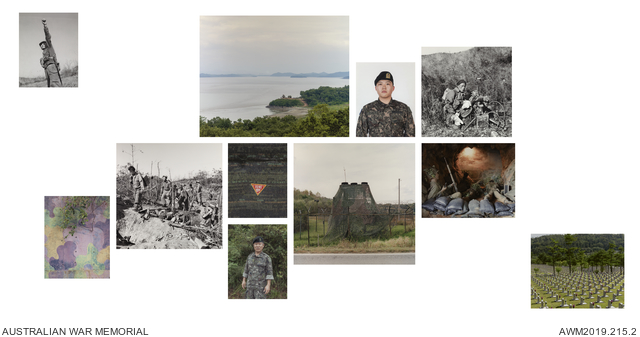| Place | Asia: Korea |
|---|---|
| Accession Number | AWM2019.215.2 |
| Collection type | Art |
| Object type | Installation |
| Physical description | Photography; digital pigment print on archival rag photographique paper |
| Maker |
Grant, Lee |
| Date made | 2019 |
| Conflict |
Korea, 1950-1953 |
| Copyright |
Item copyright: AWM Licensed copyright |
Mnemosyne: And the rivers still flow towards an open sea

Consisting of 11 photographs, "And the rivers still flow towards and open sea" presents the Korean experience of the Korean War. It is one of two series of photographs that comprise "Mnemosyne" by artist Lee Grant, responding the history and legacy of the Korean War shared between the Republic of Korea and Australia.
Grant was selected by the Australian War Memorial as the Australian artist for the inaugural artist residency exchange project with the Republic of Korea. (Taedong Kim was the Korean artist, he spent a month based at the Australian War Memorial.) Grant travelled to Korea to research the history and legacy of the conflict. She visited historic sites and met with current and former service personnel and civilians who lived through the war. She then undertook research at the Australian War Memorial and met with Australian veterans. "Mnemosyne" includes two series of photographs, "Towards a field of sleep" and "And the rivers still flow towards an open sea". Grant's own photographs are complemented with archival photograph's from the Memorial collection. Mnemosyne is the name of the ancient Green goddess of memory and remembrance.
The artist wrote about this project:
"My intentions in creating this work, were to have a conversation with the collection and to consider my own work alongside that of other photographers who trod in the same places before me. It was a way of corresponding with some of the official war photographers who recorded, in fascinatingly different ways, Australian soldiers going about the acts of war. ... I became interested in the disjunct between actual experience and photographic representation, as well as photography’s ability to supplant memory. In this sense, I am referencing the fiction of memory and how as nations (and individuals) we choose to remember the past as we do and how such memories go on to shape the present and more importantly the future, even after we are all long gone. In piecing each work together, I wanted people to reflect on the long-term unintended consequences of the Korean War (and it goes without saying, of war in general)." - Lee Grant, 2019
- And the rivers still flow towards an open sea: In the ranks of the 1st Battalion
- And the rivers still flow towards an open sea: Guarding the border: a view across the Imjin river to North Korea
- And the rivers still flow towards an open sea: Private First Class Jeong Ji-Hun
- And the rivers still flow towards an open sea: Private Kim Jin-Tai
- And the rivers still flow towards an open sea: Korean Camo
- And the rivers still flow towards an open sea: During the United Nations (UN) Forces offensive
- And the rivers still flow towards an open sea: Mine warning sign in the DMZ
- And the rivers still flow towards an open sea: Sergeant Major Kim Dong-Won
- And the rivers still flow towards an open sea: Military border armed guard post
- And the rivers still flow towards an open sea: A diorama of war at the Historic Park of Geoje POW Camp
- And the rivers still flow towards an open sea: Korean Martyrs